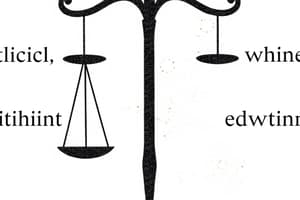Podcast
Questions and Answers
What is the primary reason for the establishment of moral duties according to the self-interested perspective?
What is the primary reason for the establishment of moral duties according to the self-interested perspective?
- To promote intrinsic virtues
- To deter emotional decision-making
- To identify individual ethics
- To facilitate social cooperation (correct)
According to Aristotle, what is considered the ultimate goal of human life?
According to Aristotle, what is considered the ultimate goal of human life?
- Self-preservation
- Social cooperation
- Eudaimonia (correct)
- Power accumulation
How does Aristotle define the fulfillment of the human function?
How does Aristotle define the fulfillment of the human function?
- Striving for material success
- Pursuing self-interests
- Living rationally in accordance with virtue (correct)
- Engaging in social contracts
What does the self-interested view suggest about altruism?
What does the self-interested view suggest about altruism?
According to the philosophical views represented, how do emotional and rational aspects contribute to morality in humans?
According to the philosophical views represented, how do emotional and rational aspects contribute to morality in humans?
What would Aristotle advise in this scenario?
What would Aristotle advise in this scenario?
How does Kant's ethical framework evaluate the act of promise-keeping?
How does Kant's ethical framework evaluate the act of promise-keeping?
What is the primary goal of Aristotle's ethical theory?
What is the primary goal of Aristotle's ethical theory?
What key aspect does Mill's utilitarianism focus on in moral decision-making?
What key aspect does Mill's utilitarianism focus on in moral decision-making?
Which of the following critiques applies to Kant's moral philosophy?
Which of the following critiques applies to Kant's moral philosophy?
How would Aristotle likely view the act of breaking a promise if the other party is oblivious?
How would Aristotle likely view the act of breaking a promise if the other party is oblivious?
What does violating the categorical imperative imply in Kant's view?
What does violating the categorical imperative imply in Kant's view?
Which ethical approach values personal happiness as the primary consideration?
Which ethical approach values personal happiness as the primary consideration?
Which philosopher emphasizes the need for reason and virtue to guide natural inclinations?
Which philosopher emphasizes the need for reason and virtue to guide natural inclinations?
How does Mill view the role of natural inclinations in moral actions?
How does Mill view the role of natural inclinations in moral actions?
Which philosopher's perspective might overlook the potential for altruism beyond self-preservation?
Which philosopher's perspective might overlook the potential for altruism beyond self-preservation?
What is a criticism of Kant's moral philosophy regarding inclinations?
What is a criticism of Kant's moral philosophy regarding inclinations?
What underlying emotion is associated with feelings of injustice when promises are broken?
What underlying emotion is associated with feelings of injustice when promises are broken?
Which philosopher believes that moral actions should be evaluated mainly by the happiness they bring?
Which philosopher believes that moral actions should be evaluated mainly by the happiness they bring?
Which philosophical stance is critiqued for potentially simplifying morality to merely pursuing pleasure?
Which philosophical stance is critiqued for potentially simplifying morality to merely pursuing pleasure?
In the discussion of moral actions, which philosopher aligns self-interest as a primary motivator?
In the discussion of moral actions, which philosopher aligns self-interest as a primary motivator?
What is Kant's view on promises?
What is Kant's view on promises?
What distinguishes Mill’s definition of happiness from Aristotle’s?
What distinguishes Mill’s definition of happiness from Aristotle’s?
How does Mill's approach to happiness consider individual circumstances?
How does Mill's approach to happiness consider individual circumstances?
What is a potential weakness of Mill’s definition of happiness?
What is a potential weakness of Mill’s definition of happiness?
Which philosophical approach links happiness with long-term integrity?
Which philosophical approach links happiness with long-term integrity?
What balances personal happiness and minimizing harm in Mill's framework?
What balances personal happiness and minimizing harm in Mill's framework?
Which of these aspects does Mill emphasize about happiness?
Which of these aspects does Mill emphasize about happiness?
What is a key feature of Kant’s moral philosophy?
What is a key feature of Kant’s moral philosophy?
What does Aristotle identify as the foundation of true happiness?
What does Aristotle identify as the foundation of true happiness?
How does Mill’s view on happiness differ from Aristotle’s perspective?
How does Mill’s view on happiness differ from Aristotle’s perspective?
What is the primary critique of Mill’s account of happiness mentioned in the content?
What is the primary critique of Mill’s account of happiness mentioned in the content?
In the context of ethics, how is pleasure viewed differently by Aristotle compared to Kant?
In the context of ethics, how is pleasure viewed differently by Aristotle compared to Kant?
Which of the following best describes Aristotle’s approach to moral worth?
Which of the following best describes Aristotle’s approach to moral worth?
Which of the following elements do Aristotle’s and Mill’s ethical views share?
Which of the following elements do Aristotle’s and Mill’s ethical views share?
What is meant by Aristotelian 'Eudaimonia'?
What is meant by Aristotelian 'Eudaimonia'?
What role does pleasure play in Aristotle's ethical framework?
What role does pleasure play in Aristotle's ethical framework?
According to Kant, what is the primary moral violation when someone lies or breaks a promise?
According to Kant, what is the primary moral violation when someone lies or breaks a promise?
How does Mill define injustice in his framework?
How does Mill define injustice in his framework?
What does the feeling of injustice reflect for Kant?
What does the feeling of injustice reflect for Kant?
In Mill's view, why are lying and breaking promises considered unjust?
In Mill's view, why are lying and breaking promises considered unjust?
What is a key aspect of Kant's moral law regarding lying?
What is a key aspect of Kant's moral law regarding lying?
What does Mill believe the consequences of lying do to society?
What does Mill believe the consequences of lying do to society?
According to Kant, what feeling arises when someone acts against moral duties?
According to Kant, what feeling arises when someone acts against moral duties?
What does Mill's framework suggest about the feelings of individuals affected by lies?
What does Mill's framework suggest about the feelings of individuals affected by lies?
Flashcards
Moral Duties (Hobbesian View)
Moral Duties (Hobbesian View)
Moral duties aren't inherent; they're created to promote cooperation and prevent conflict, stemming from self-interest.
Human Nature (Hobbesian)
Human Nature (Hobbesian)
Humans are naturally self-interested, seeking self-preservation, power, and comfort, using reason to achieve these goals.
Aristotle's Moral Basis
Aristotle's Moral Basis
Morality arises from fulfilling the human function—rational activity aligned with virtue—to achieve flourishing (eudaimonia).
Human Nature (Aristotle)
Human Nature (Aristotle)
Signup and view all the flashcards
Eudaimonia
Eudaimonia
Signup and view all the flashcards
Mill's Happiness
Mill's Happiness
Signup and view all the flashcards
Kant's Ethics
Kant's Ethics
Signup and view all the flashcards
Utilitarianism
Utilitarianism
Signup and view all the flashcards
Consequentialism
Consequentialism
Signup and view all the flashcards
Higher Pleasures
Higher Pleasures
Signup and view all the flashcards
Aristotle's Happiness
Aristotle's Happiness
Signup and view all the flashcards
Moral Duty
Moral Duty
Signup and view all the flashcards
Collective Focus
Collective Focus
Signup and view all the flashcards
Aristotle's Approach
Aristotle's Approach
Signup and view all the flashcards
Kant's Categorical Imperative
Kant's Categorical Imperative
Signup and view all the flashcards
Mill's Utilitarianism
Mill's Utilitarianism
Signup and view all the flashcards
Categorical Imperative
Categorical Imperative
Signup and view all the flashcards
Virtue Ethics
Virtue Ethics
Signup and view all the flashcards
Conflicting considerations
Conflicting considerations
Signup and view all the flashcards
Natural Inclinations
Natural Inclinations
Signup and view all the flashcards
Moral Actions
Moral Actions
Signup and view all the flashcards
Mill's View
Mill's View
Signup and view all the flashcards
Hobbes's View
Hobbes's View
Signup and view all the flashcards
Kant's View
Kant's View
Signup and view all the flashcards
Aristotle's View
Aristotle's View
Signup and view all the flashcards
Feeling of Injustice
Feeling of Injustice
Signup and view all the flashcards
Aristotle's View on Happiness
Aristotle's View on Happiness
Signup and view all the flashcards
Mill's View on Happiness
Mill's View on Happiness
Signup and view all the flashcards
Injustice Motivation
Injustice Motivation
Signup and view all the flashcards
Aristotle's View on Pleasure
Aristotle's View on Pleasure
Signup and view all the flashcards
Kant's vs. Aristotle's Happiness
Kant's vs. Aristotle's Happiness
Signup and view all the flashcards
Role of Pleasure (Aristotle)
Role of Pleasure (Aristotle)
Signup and view all the flashcards
Role of Pleasure (Mill)
Role of Pleasure (Mill)
Signup and view all the flashcards
Kant's Moral Law
Kant's Moral Law
Signup and view all the flashcards
Kant's View on Lying/Breaking Promises
Kant's View on Lying/Breaking Promises
Signup and view all the flashcards
Feeling of Injustice (Kant)
Feeling of Injustice (Kant)
Signup and view all the flashcards
Mill's View on Injustice
Mill's View on Injustice
Signup and view all the flashcards
Mill's Injustice and Harm
Mill's Injustice and Harm
Signup and view all the flashcards
Feeling of Injustice (Mill)
Feeling of Injustice (Mill)
Signup and view all the flashcards
Moral Duty vs. Consequences
Moral Duty vs. Consequences
Signup and view all the flashcards
Study Notes
Summary of Ethics Study Questions
- The study questions cover various ethical frameworks, including utilitarianism, deontology, and virtue ethics, examining their application to different scenarios.
- The analyses consider the roles of happiness, duty, and virtue in ethical decision-making across different philosophical perspectives.
- The questions inquire into the role of happiness in ethics, distinctions between virtuous, continent, and incontinent persons, and the application of ethical theories to complex dilemmas.
- The scenarios posed require evaluating actions under different ethical frameworks.
- The summaries detail the perspectives of Mill, Kant, and Aristotle on happiness, duty, and the good life.
- Various scenarios illustrate the nuances of applying ethical theories to complex situations, such as a friend's voting decision or the dilemma of sacrificing one person to save many others.
- The relationship between personal actions and social well-being features prominently in the analyses.
Studying That Suits You
Use AI to generate personalized quizzes and flashcards to suit your learning preferences.




